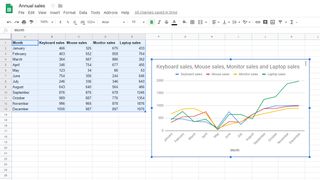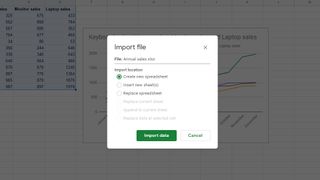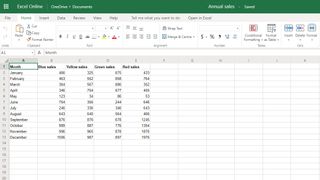
Google Sheets and Microsoft Excel are two of the best options for working with spreadsheets, allowing you to manage figures, make calculations, create graphs and charts, and much more.
Google Sheets started life as a very basic spreadsheet application, but it's developed rapidly in recent years with the addition of powerful tools like pivot tables, and is now a viable alternative to Microsoft Excel in most circumstances.
So what are the main differences between the two, and how can you decide which one to use?
Cost
One of the biggest advantages of Google Docs is that it's free for personal use (though if you own a business you'll want to check out the various G Suite plans, which give you more features and more storage space on Google Drive).
A Microsoft Office 365 subscription, which includes Excel, Word, PowerPoint and all of Microsoft's other productivity software starts at $69.99/£59.99/AU$99 per year for personal use.
However, the full version of Office isn't the only option; if you're happy working in your browser, it's also worth considering Microsoft Office Online. It's not as powerful as the desktop software, but it's fine for all but the most complex spreadsheets and is free for home users.

Data portability
When you're deciding whether to use Microsoft Excel or Google Sheets, think about whether you're going to be transferring data between the two. While you can export spreadsheets from Google Sheets in Microsoft Excel format, and import Excel files into Sheets, you can't simply copy and paste cells from one to the other.
Are you a pro? Subscribe to our newsletter
Sign up to the TechRadar Pro newsletter to get all the top news, opinion, features and guidance your business needs to succeed!
You might also run into some formatting issues if you export and import spreadsheets, because Google Sheets and Microsoft Office don't work exactly the same way. If you're going to be working with any existing spreadsheets, it's sensible to stick with whichever format they're already in to avoid potential headaches.

Saving and syncing
Google Sheets will save your work automatically, so you don't need to worry about accidentally closing the window while you're working. Excel will give you a warning if you try to close the program without saving your work, and if you do shut it down by mistake, you stand a good chance of restoring some of your work using Microsoft's built-in recovery tool, but there are no guarantees.
Google Sheets will save your spreadsheets to your Google Drive account, enabling you to access them anywhere. Microsoft Excel can sync your files with Microsoft OneDrive, which takes a little extra effort, but if you've invested in an Office 365 subscription you'll have an impressive 1TB of cloud storage at your disposal.
The best choice here really depends on your priorities: convenience or sheer storage space.
Collaboration
If you want to collaborate with other people, Google Sheets is the natural first choice. You can simply email colleagues a link allowing them to join in making (or just suggesting) changes and adding comments, all of which will be visible in real time.
Microsoft Excel is primarily a one-man show, but you can work on Excel documents together via Microsoft Excel Online, which is essentially a pared-back version of the full desktop software, or get more options if you and your teammates have Microsoft Office 365 Business subscriptions.
Google might be handier for the time being, but it's not as clear-cut as it once was. Don't rule Excel out before taking a look at the options.

Compatibility
Bear in mind which other software you're going to be using for your day-to-day work. Spreadsheets from Google Sheets can be transferred easily between Google's other apps, but if you want to work with third-party software (accounting software, for example) then you'll be better off with Microsoft Excel.
Features
When Google Sheets first arrived on the scene, it was a very simple tool that was little more than a calculator app. Things have come an awfully long way since then, and it now boasts many of Excel's most powerful and useful features (such as pivot tables), but it's still not caught up completely.
Excel has an enormous head start, and features a formula for pretty much every data-driven task you can think of. It's also receiving rapid updates, with new tools like infographics now in its bow, so if you work with data on a regular basis performing complex tasks then it's still the leader by a wide margin.
- Check out our guide to the best free office software
Cat is the editor of TechRadar's sister site Advnture. She’s a UK Athletics qualified run leader, and in her spare time enjoys nothing more than lacing up her shoes and hitting the roads and trails (the muddier, the better)
Most Popular


